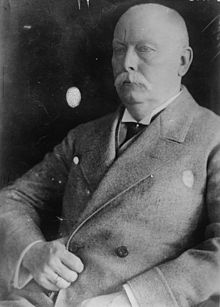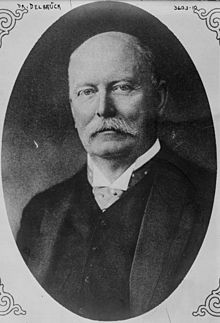Clemens von Delbrück
Clemens Gottlieb Ernst Delbrück , from 1916 von Delbrück (born January 19, 1856 in Halle an der Saale , † December 17, 1921 in Jena ) was a German politician .
Life and work
Clemens Delbrück , the Protestant confession was studied after graduating from the City Gymnasium in Halle (Saale) 1873 in Halle , Heidelberg , Greifswald and Berlin law . After his legal clerkship and the Great State Examination , he became a Prussian government assessor in Marienwerder in 1882 . In 1891 he became a councilor at the high presidium in Danzig . In 1912 Delbrück received an honorary doctorate from Berlin University. Upon dismissal from his offices with the award of the Prussian Black Eagle Order on May 22, 1916, he was raised to the hereditary Prussian nobility , with a letter of arms dated July 31, 1916.
Delbrück was married to Meta Liedke since 1883. The couple had three sons and a daughter, including the writer Joachim von Delbrück (1886–1951).
Political party
After the First World War , Delbrück was one of the founders of the DNVP .
MP
From 1896 to 1902 Delbrück was a member of the Prussian mansion , in which he joined the so-called New Fraction.
Delbrück was a member of the Weimar National Assembly in 1919/1920 . There he was a member of the committee for the preliminary discussion of the draft constitution of the German Reich . He turned in vain against what he saw as an overly strong position of civil rights in the constitution by speaking of a "hypertrophy of fundamental rights".
He also proposed that the Chancellor's policy-making authority should be laid down while the ministers were simultaneously independent in managing their respective departments and making majority decisions on bills in the cabinet. With this proposal he was able to prevail in the constitutional committee. From 1920 until his death he was a member of the Reichstag .
Public offices
From 1885 to 1891 Delbrück was district administrator in the district of Tuchel near Bromberg . From 1896 to 1902 he was Lord Mayor of the city of Danzig , then until 1905 Lord President of the Province of West Prussia .
In 1905 he joined the Prussian state government as Minister of Commerce. In 1909 he moved to the Reich government, where he became State Secretary of the Reich Office of the Interior and Deputy to the Reich Chancellor , as well as Chairman of the Federal Council and Prussian State Minister without a portfolio. Like his Chancellor Theobald von Bethmann Hollweg , Delbrück was not a supporter of the parliamentary system. However, both modernized the supreme Reich administration following Delbrück's proposals from 1914, which de facto envisaged a Reich government as a collegial body. Bills should better be discussed with parliamentarians.
From 1914 to 1916 he was also Vice President of the Prussian State Ministry. In 1918 he was briefly head of the " Secret Civil Cabinet ".
Publications
- Economic mobilization in Germany in 1914 . Verlag für Kulturpolitik, Munich 1924 (posthumously), edited by Joachim von Delbrück.
literature
- Eckhard Hansen, Florian Tennstedt (Eds.) U. a .: Biographical lexicon on the history of German social policy from 1871 to 1945 . Volume 1: Social politicians in the German Empire 1871 to 1918. Kassel University Press, Kassel 2010, ISBN 978-3-86219-038-6 , p. 31 ( online , PDF; 2.2 MB).
- Joachim von Delbrück : Clemens von Delbrück. A character image . G. Stilke Publishing House, Berlin 1922.
- Genealogical manual of the nobility . Noble houses. B Volume XVIII, Volume 95 of the complete series, CA Starke Verlag, Limburg (Lahn) 1989, ISSN 0435-2408 , p. 75.
- Acta Borussica. Volume 9: 1900-1909. (PDF file; 2.74 MB).
- Gerhard A. Ritter : Delbrück, Clemens von. In: New German Biography (NDB). Volume 3, Duncker & Humblot, Berlin 1957, ISBN 3-428-00184-2 , p. 575 f. ( Digitized version ).
- Matthias Steinbach , Uwe Dathe: Clemens von Delbrück A German Tory between the Empire and the Weimar Republic. In: Vierteljahrshefte für Zeitgeschichte, issue 1, 2010 ( PDF file; 2.04 MB ).
Web links
- Literature by and about Clemens von Delbrück in the catalog of the German National Library
- Newspaper article about Clemens von Delbrück in the press kit of the 20th century of the ZBW - Leibniz Information Center for Economics .
- Digital estate
- Literature list in the online catalog of the Berlin State Library
- Clemens von Delbrück in the database of members of the Reichstag
Individual evidence
- ^ Manfred Rauh: Parliamentarization of the German Empire. Droste Verlag, Düsseldorf 1977, p. 147.
- ^ Manfred Rauh: Parliamentarization of the German Empire. Droste Verlag, Düsseldorf 1977, pp. 38-40, p. 42.
| personal data | |
|---|---|
| SURNAME | Delbrück, Clemens von |
| ALTERNATIVE NAMES | Delbrück, Clemens Gottlieb Ernst (full name); Delbrück, Clemens Gottlieb Ernst von (full name since 1916) |
| BRIEF DESCRIPTION | German politician (DNVP), MdR |
| DATE OF BIRTH | January 19, 1856 |
| PLACE OF BIRTH | Halle (Saale) |
| DATE OF DEATH | December 17, 1921 |
| Place of death | Jena |


